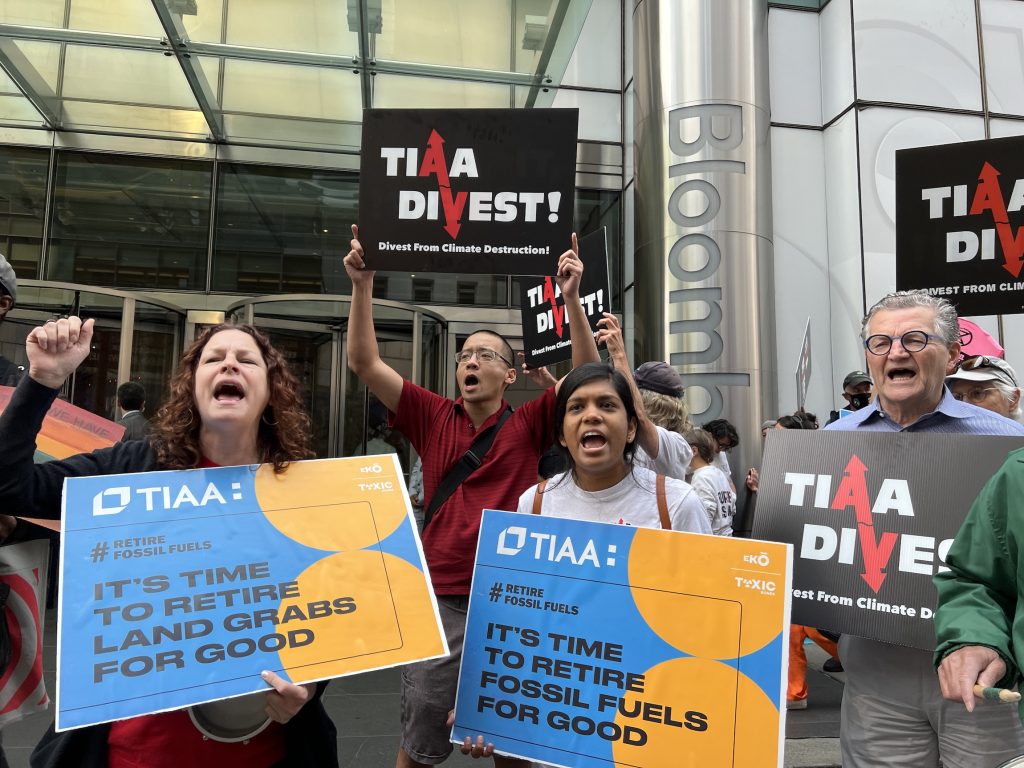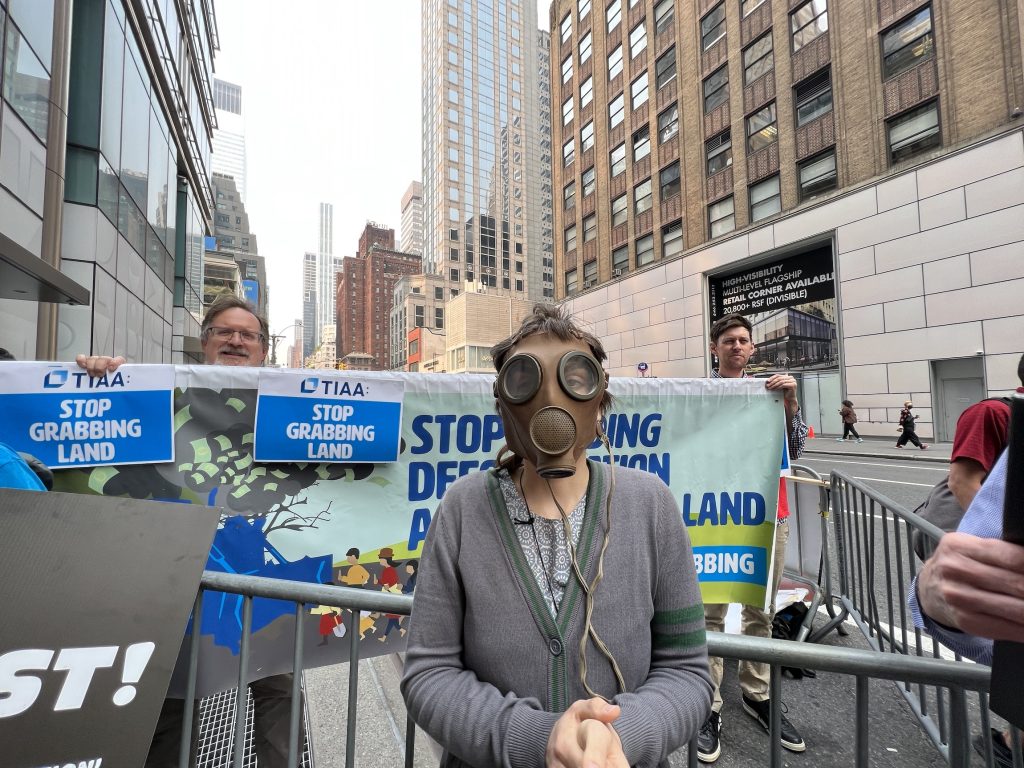TIAA, the retirement fund manager with $1.3 trillion in assets, continues to refuse to divest from fossil fuels and farmland, even as climate campaigners rallied in NYC that was choked with apocalyptic smoke.
On June 7, we teamed up with TIAA-Divest and the Stop Land Grabs campaign to mobilize an action of nearly 80 people outside the Bloomberg Invest conference in New York City. While the CEO of TIAA, Thasunda Brown Duckett, was speaking inside the conference, those of us outside chanted “Our future is burning! And you’re still not learning!”
For context, many of the protestors, including myself, have our retirement savings with TIAA (Teachers Insurance and Annuity Association) and this is why we protest: we’re tired of their immoral investments in fossil fuels, widespread greenwashing, and land grabbing all in the name of “social responsibility.”

Photo: Jenna Farineau/ActionAid.
Other TIAA clients and activists, including members of the Toxic Bonds campaign and Ekō joined the action online. When virtual participants in the hybrid conference asked Brown Duckett about TIAAs fossil fuel investments including coal, conference managers temporarily restricted the chat feature.
Even while we chanted, danced, and carried out street theater, smoke from climate change-driven wildfires slowly drifted into New York from the north. By the afternoon, we and other New Yorkers had to mask up to protect ourselves from rapidly deteriorating air quality that lasted for several days after the action.
TIAA is a Fortune 100 company which has long relied on an image of social responsibility to take control of more than a trillion dollars worth of the retirement savings of teachers, university staff, healthcare, and non-profit workers. TIAA’s leaders are tarnishing that image, and even worse, they are harming the future of the planet and its people. TIAA is more invested in coal, gas and oil than many of its competitors (when taken as a proportion of its total investments).
In a little more than a decade TIAA’s leaders have also turned the company into the world’s leading land grabber. They have accumulated 3 million acres of land for industrial agriculture and timber, negatively impacting rural communities, especially Black and Brown communities and Indigenous Peoples in Brazil and the United States, and eight other countries.
The time has come for TIAA to divest from fossil fuels and farmland in order to limit the already severe impact of the global climate and food crises, and to ensure human rights.
TIAA falsely claims that by grabbing up large amounts of land the company will help feed the planet. In contrast, food security experts, such as UN Rapporteur Michael Fakhri, hold that decentralized food production and greater access to land for local populations is needed for the Human Right to Food to be realized.
TIAA also claims that its land will be a source of green energy and carbon sequestration. However, international climate experts say that plantation-based fuels such as ethanol, biodiesel and wood pellets – all of which are produced on TIAA’s lands – only increase carbon emissions. Additionally, while it is possible that TIAA’s farm and timberlands may sequester some carbon – though experts are also concerned that agribusiness and industrial timber practices are unlikely to achieve adequate or permanent carbon sequestration – TIAA is trying to use its lands to “offset” its carbon emissions, and therefore allowing the company to continue to invest in fossil fuels and other dirty industries. Carbon offsets have also been scathingly condemned by climate experts and the United Nations who have found that there isn’t enough land in the whole world that would allow for companies and governments to offset their carbon emissions. Offsets are little more than greenwash at this point, when the climate crisis is growing increasingly severe and urgent action is needed right now.
Finally, TIAA’s climate plan has been shown to be nothing but smoke and mirrors. In November 2022, the Institute for Energy Economics and Financial Analysis, released a report showing TIAA’s portfolio to hold at least 78 billion dollars in investments in coal, gas and oil industries, far more than had been previously known. It analyzed TIAA’s climate plan and found it to be deceptive as well as inadequate, by only covering a small portion of TIAA’s assets under management and not providing the response needed to meet the goals of international climate agreements which it claimed to support.
Getting TIAA out of farmland, forests, and fossil fuels
Since 2016, we have been working with a number of organizations in the Stop Land Grabs campaign to stop TIAA’s acquisition of farmland. During this time, we have joined with and organized thousands of TIAA clients and organizations to pressure the company to change its business practices.
In 2021, we teamed up with fossil fuel divestment campaigners to demand that TIAA divest from farmland, timberland, and fossil fuels. More recently, we have racked up a string of victories:
- In December 2022, eight hundred TIAA participants filed an 80 page complaint against TIAA’s continued investments in fossil fuels and land grabs for industrial agriculture and timber with The Principles for Responsible Investment (PRI), a private sector organization organized as part of a UN initiative. Unfortunately TIAA refused to make a public response and the PRI board decided it did not have the mandate to investigate.
- On April 11 2023, an in-depth report by Bloomberg journalists revealed new information about the impacts of TIAA and other investors grabbing land and scarce water resources in California, draining deep aquifers and causing land to sink, ruining infrastructure and causing water to dry up for smaller farms and communities of color such as Woodville, CA.
- On May 2, investigative journalists at the Organized Crime and Corruption Project found that TIAA ignored obvious warning signs in making deals in Brazil by acquiring land from known land grabbers. They also used shell companies and lease-back schemes to dodge taxes and restrictions on foreign land ownership. TIAA clients’ savings were put in jeopardy as the Brazilian government’s Institute of Settlement and Land Reform found the scheme to be illegal.
- On May 14, TIAA-Divest members showed up at Brown Duckett’s commencement speech at the University of Pennsylvania’s Wharton School of Business. They handed out 300 flowers and flyers with information about TIAA’s practices to graduates and faculty. The action garnered coverage from Public Radio.
The growing number of actions across the U.S. and media coverage and media interest shows that our campaign is growing and that TIAA’s leaders can no longer get away with attempts to greenwash its land grabs and fossil fuel investments.
Brown Duckett, and newer members of the Board of Governors such as Johns Hopkins University President, Ronald Daniels, and Cecilia Conrad of the MacArthur Foundation, publicly express interest in issues of racial justice and the environment. One would think they would be concerned about the harm that fossil fuels and land grabs for large-scale agriculture and timber are causing to communities of color and to the entire planet.
TIAA-Divest members have called upon TIAAs Governors and CEO to meet with them to discuss the grave shortcomings of TIAA’s climate plan and how to end their harmful investments in fossil fuels and land speculation. So far they have not responded.
A very large rally for fossil fuel divestment will be happening in New York City on September 17. TIAA participants will be joining in and organizing on campuses to keep the pressure up. The growing movement will not only be in the streets but also in state legislatures and Congress. It’s clearly time for TIAA’s Governors to listen, divest, and then reinvest in ways that benefit the planet and its people.

